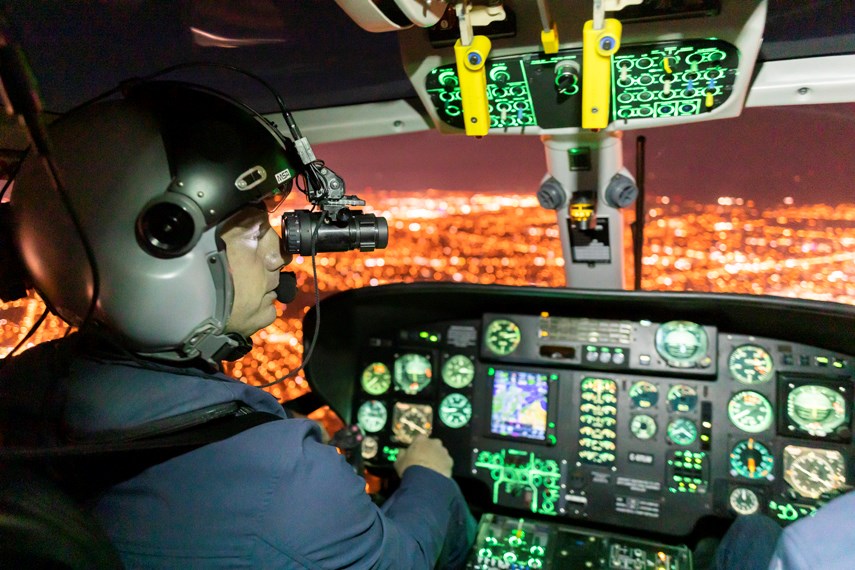This story has been updated since it was first posted.
They’ve spent many a long night in the cold and dark. Now, North Shore Rescue’s volunteers are getting some high-tech eyes in the night to help them and their subjects get out quickly and safely.
The province announced Friday morning that North Shore Rescue and Talon Helicopters have been approved to fly and carry out rescues using night vision goggles – the first volunteers in Canada to have clearance to use technology previously available only to police, air ambulance and the military.
“This is a monumental change in search and rescue in British Columbia,” said Mike Danks, North Shore Rescue’s team leader. “We're confident this is going to make operations safer for the rescuers and it's going to decrease the exposure time for the subjects we're looking for.”
More than a third of North Shore Rescue’s calls for help come within an hour of nightfall, at which time Talon Helicopters must be grounded. That leaves rescuers with no choice but to go in on foot, which can take hours to reach a lost or injured person, even if the team knows where to find them.
“The whole goal is to reduce the amount of people that are put at risk. This is going to give us the ability to search at night, so we no longer have to send five or six teams out searching for someone in darkness,” Danks said. “I'm very confident that this will make a difference in saving many, many lives.”
The goggles work by amplifying even the smallest amount of light by a factor of 50,000. During early tests, crews could spot a cellphone light from a kilometre away.
While the pilots were training, they found they could land safely in remote, unfamiliar locations in total darkness.
“I was absolutely astonished. If you took the goggles off, you could wave your hand in front of your face and not see your hand,” Danks said. “It's unbelievable.”
B.C.'s Minister of Public Safety and Solicitor General Mike Farnworth, said the team was approved because of their close proximity to a major urban centre, and because so many of their rescues happen at night.
But getting the approvals has been a heroic effort in itself, Danks said. The team invested more than $100,000 for seven sets of goggles exactly three years ago when Talon Helicopter purchased a top-of-the-line Airbus AS365N2 Dauphin helicopter capable of flying after dark.
When it came to getting permission to use them, senior bureaucrats within Emergency Management BC didn’t believe the benefits would outweigh the risks, Danks said.
“The first people we talked to that were quite high up said, ‘It's never gonna happen,’” Danks said.
Danks first enlisted the support of the three North Shore mayors who wrote to Solicitor General Mike Farnworth urging him approve the goggles. Later, the North Shore’s two police chiefs and three fire chiefs followed up with their own letter.
Danks, however, credits North Vancouver-Lonsdale MLA Bowinn Ma and a now retired executive director response Stan Bates with going to bat for the team and arranging meetings in the Legislature for Danks to make his case in person.
“North Shore Rescue is leading the way once again,” Ma said in a release. “As we approach the longest nights of the year, I'm comforted in knowing that this pilot project will enable the use of night-vision equipment that will help search and rescue crews save lives.”
Talon Helicopter owner Peter Murray said his team has been itching to use them after such a long, frustrating wait.
“We're just thrilled and excited and proud to be able to put this technology to use to help people out and help the team out,” he said.
After quick adjustment, Murray said the goggles have a surprisingly natural feel to them.
“Once you start flying, your brain kind of just sees into the darkness,” he said. “Ultimately, the night vision goggles turn night into day.”
At first, there will be just four members of the North Shore Rescue’s air operations team trained to use night vision, including Danks. It means they’ll be the first ones to get the call when someone is lost or injured at night, although they will still need volunteer boots on the ground when it comes to safely extracting their subjects.
For the rest of the team, it will mean more time at home with their families, something badly needed for the volunteers who are now typically called on 130 times per year. Eventually, Danks said he wants to see the entire team trained and certified to use the night vision goggles.


